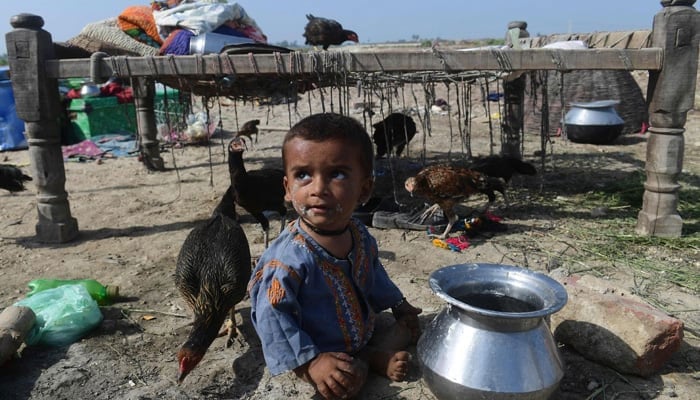Social protection
LAHORE: A joint study by the International Trade Organization, Save the Children and UNICEF reveals that globally, 1.4 billion children, aged under 15, lack any form of social protection, leaving them vulnerable to disease, poor nutrition and poverty.
In low-income countries, fewer than 1-in-10 children have access to child benefits, highlighting a significant disparity compared to the coverage enjoyed by children in high-income countries.
Although Pakistan is classified as a low middle income country, it houses a very large number of under-nourished, stunted and wasted children. Over 40 per cent or 12 million of Pakistan’s children under five years of age are stunted and 17.7 per cent or around 5.3 million are wasted (low weight for height), with 2.5 million estimated to be severely wasted, according to the National Nutrition Survey 2018 of the Ministry of National Health Services (NHS).
No further survey was carried out by the NHS, but the rate at which poverty has increased in the last 6 years, accompanied with high food inflation, suggests that the situation must have deteriorated even further.
There is no state program worth noting that specifically targets the health and nutrition of children. All the subsidies doled out by the government of Pakistan are unconditional and the recipient could use it the way he/she wants (the subsidy is provided to the head of the family under the Benazir Income Support Program). Children probably get a fraction of that support.
In most of the countries where the conditions of the children improved, the state support to the families was conditional. For instance, a certain amount was given to parents on a monthly basis if one of their children attended school regularly (90 percent attendance).
Even in Pakistan, during the Shaukat Aziz era, the government distributed ration to the families that sent one girl to school in some backward districts of South Punjab. It accelerated girls' enrollment. The program was later withdrawn for reasons known to the then rulers.
Some food companies in Pakistan also select schools where poor children get education and supply milk or flavored milk and nutritious snacks to the children for a certain period of time. When their budget is exhausted they discontinue the program. This approach is not very beneficial.
The private sector must choose specific schools and continue food support for at least five years to ensure that children leave the school in better health. Studies confirm healthy snacking as being the catalyst for better academic performance, while missing out on these has been known to affect them negatively. Children who consume healthy snacks such as fruits, milk and nuts tend to perform better at school.
Child benefits in developed economies support families to afford better nourishment, health, education, and protection and are key for realising children’s rights and enhancing their potential as adults.
Child benefits are therefore critical to building inclusive and resilient economies for the future. Unfortunately, our country has not prioritised investment in social protection. Child benefits are a critical form of social protection, intended to promote the long-term well-being of children.
Many children are deprived of the basic resources and services they need to escape poverty and are therefore exposed to the long-lasting impact of hunger, malnutrition, and unrealised potential.
-
 Winter Olympics 2026: When & Where To Watch The Iconic Ice Dance ?
Winter Olympics 2026: When & Where To Watch The Iconic Ice Dance ? -
 Melissa Joan Hart Reflects On Social Challenges As A Child Actor
Melissa Joan Hart Reflects On Social Challenges As A Child Actor -
 'Gossip Girl' Star Reveals Why She'll Never Return To Acting
'Gossip Girl' Star Reveals Why She'll Never Return To Acting -
 Chicago Child, 8, Dead After 'months Of Abuse, Starvation', Two Arrested
Chicago Child, 8, Dead After 'months Of Abuse, Starvation', Two Arrested -
 Travis Kelce's True Feelings About Taylor Swift's Pal Ryan Reynolds Revealed
Travis Kelce's True Feelings About Taylor Swift's Pal Ryan Reynolds Revealed -
 Michael Keaton Recalls Working With Catherine O'Hara In 'Beetlejuice'
Michael Keaton Recalls Working With Catherine O'Hara In 'Beetlejuice' -
 King Charles, Princess Anne, Prince Edward Still Shield Andrew From Police
King Charles, Princess Anne, Prince Edward Still Shield Andrew From Police -
 Anthropic Targets OpenAI Ads With New Claude Homepage Messaging
Anthropic Targets OpenAI Ads With New Claude Homepage Messaging -
 US Set To Block Chinese Software From Smart And Connected Cars
US Set To Block Chinese Software From Smart And Connected Cars -
 Carmen Electra Says THIS Taught Her Romance
Carmen Electra Says THIS Taught Her Romance -
 Leonardo DiCaprio's Co-star Reflects On His Viral Moment At Golden Globes
Leonardo DiCaprio's Co-star Reflects On His Viral Moment At Golden Globes -
 SpaceX Pivots From Mars Plans To Prioritize 2027 Moon Landing
SpaceX Pivots From Mars Plans To Prioritize 2027 Moon Landing -
 J. Cole Brings Back Old-school CD Sales For 'The Fall-Off' Release
J. Cole Brings Back Old-school CD Sales For 'The Fall-Off' Release -
 King Charles Still Cares About Meghan Markle
King Charles Still Cares About Meghan Markle -
 GTA 6 Built By Hand, Street By Street, Rockstar Confirms Ahead Of Launch
GTA 6 Built By Hand, Street By Street, Rockstar Confirms Ahead Of Launch -
 Funeral Home Owner Sentenced To 40 Years For Selling Corpses, Faking Ashes
Funeral Home Owner Sentenced To 40 Years For Selling Corpses, Faking Ashes




